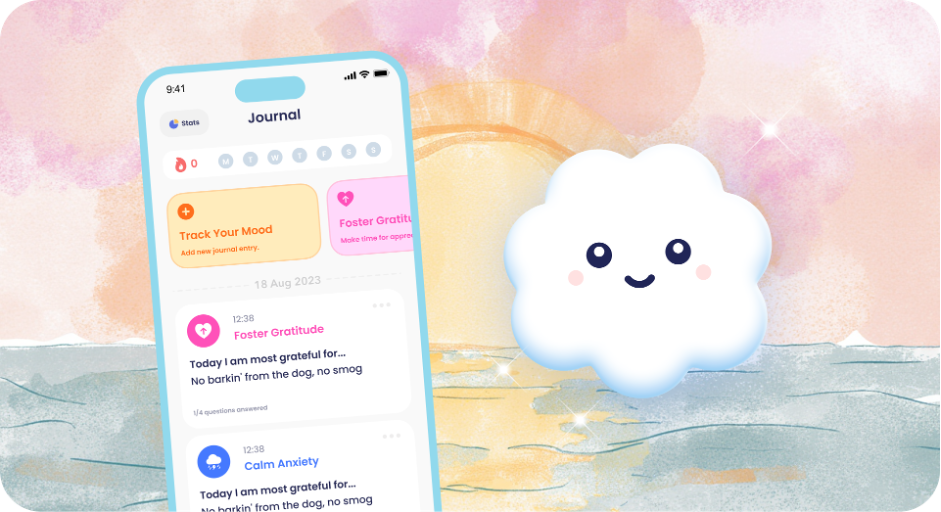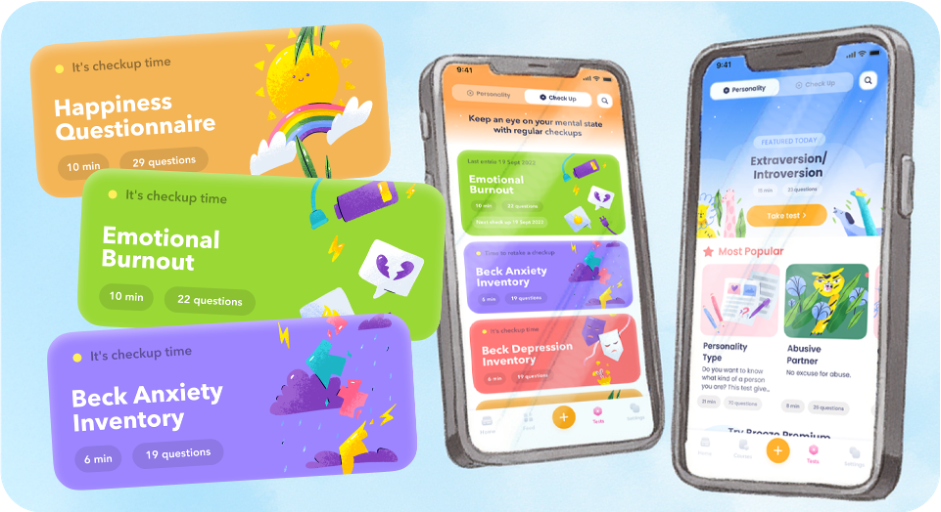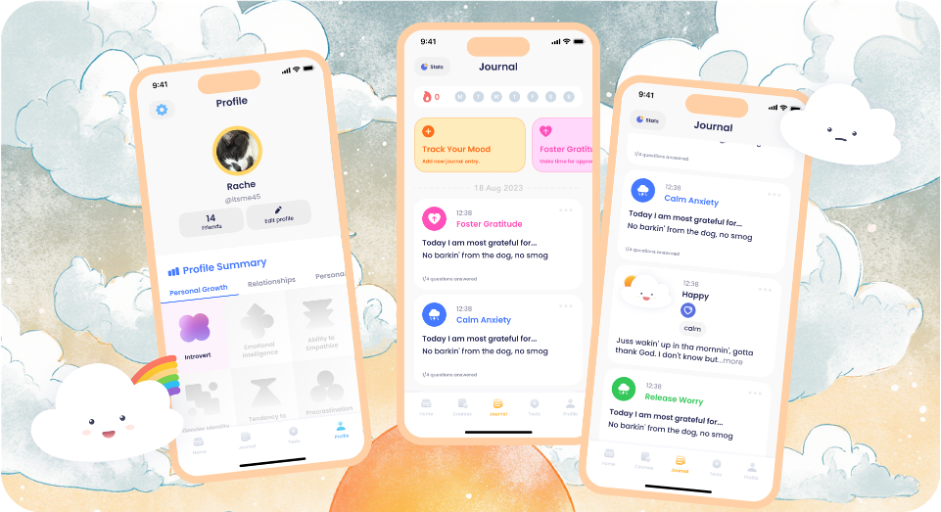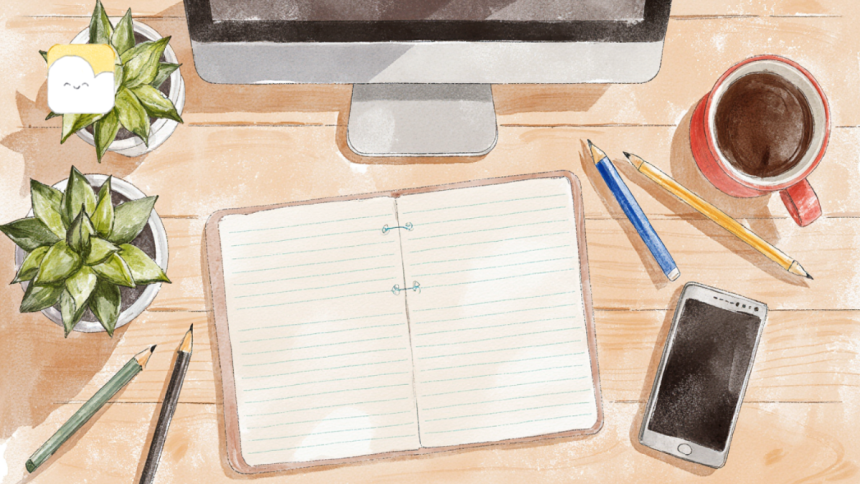We are strongly dependent on our phones, even for emotional support. Data from Harmony, a healthcare data firm, shows that adult Americans spend approximately 5 hours on smartphones daily [1]. That’s 1.5 days per week, and this time is even longer for teenagers.
There is a growing need for accessible, judgment-free tools that will meet our stimulation needs. Apps like Breeze Wellbeing are a response to this demand with a ready solution for digital self-discovery and mental health support.
In this article, we will look into why emotional assistance has moved into our pockets, how the Breeze app fits this trend, and what makes it stand out from the many self-care apps on the market. If you’ve ever wondered whether an app could actually provide daily mental support, this review is for you.
What Is Breeze Wellbeing?
Breeze Wellbeing is a self-guided self-discovery app designed to make emotional support more accessible, especially for those who may not yet be ready or able to speak with a professional. We would describe it as an extra mental well-being support with an intuitive design.
A study from Current Treatment Options in Psychiatry claims that there are nearly 10,000 mental health and wellness apps [2]. Unsurprisingly, most emerged during the pandemic, which was the most stressful time for many of us. Usually, these applications focus only on one function or vice versa, and they might have too many features to the point that you lose focus and initial motivation.
That’s why it’s essential to keep the balance between quantity and quality. What we discovered about Breeze Wellbeing is that its functions are not half-baked. If you’re going to track your mood, you get to note every little detail about your day. Journaling prompts are never generic and tailored to your experiences. There is one important reason: each feature is validated by licensed therapists.

What we appreciate the most is that Breeze does not claim to replace therapy. The app positions itself as an emotional support besides therapy sessions. The same study on mental well-being apps says that they have the potential to improve one’s emotional state if they respect privacy and are clinically effective [2].
Although you definitely cannot use it for self-diagnosis and self-treatment, you can make the most out of it, ultimately retrieving as much benefit as possible.
What Features Does Breeze Wellbeing Offer?
Self-care apps are “guilty” of symptom management and dramatizing moments of your life to collect more clicks. Breeze, on the other hand, is built around pattern recognition and addressing your current worries. You can find the key tools below.
30+ Self-Discovery Tests
There are a few people who are really self-aware. That’s what Tasha Eurich, organizational psychologist, wrote in her book Insight: The Surprising Truth About How Others See Us, How We See Ourselves, and Why the Answers Matter More Than We Think. By surveying people, she discovered that only 10-15% of people are self-aware about their desires, relationships, and thoughts.
But it’s possible soft-launch this journey. Start with light, fun options from Breeze’s tests, like humor style or real zodiac sign. Then slowly pave the way into more serious territory, such as narcissistic traits or childhood trauma.

In-App Journaling Tools
Advice to journaling is very common in well-being and self-discovery resources. But would specialists recommend it so often if it weren’t for its benefits? With Breeze, you don’t even need to carry a notebook. Don’t worry if you don’t know where to start because Breeze Wellbeing offers guided prompts for every objective. Whether it is reducing anxiety, processing emotions, or feeling grateful, you can give it a go.
Customizable Wellbeing Routines
It may be challenging to follow a routine for people with psychological distress or neurodivergents. At the same time, routine and consistent habits can help people feel better. Even though it might look like a loop, there is a way out with Breeze’s wellness routine:
- Set a goal
- Choose your frequency
- Add reminders
These routines support you emotionally without overwhelm, helping you build the life you want, step by step.
Advanced Mood Tracker & Analytics
We find mood tracking very connected to journaling. Like journaling, mood tracking gives you tools to understand how you feel. By combining both, you have the ability to reflect on why you are going through particular emotions. What Breeze Wellbeing’s mood trackers can help you with:
- Track your feelings and context.
- Attach notes or photos.
- Visualize patterns with dashboards (weekly, monthly, yearly).
- See your “year in pixels” to spot what really uplifted or drained you.
Relaxation Games for Mental Reset
Video games have a mixed image in mental health questions. However, the questionnaire from Games and Culture Journal from post-pandemic times shows that actually video games have significantly helped people to stimulate cognitively and cope with uncontrollable events [3]. For us, Breeze’s games like Flower Chain, Mindful Breathing, and Calming Waters helped to reduce overstimulation.
Optional Social Sharing
Having people around might be highly beneficial for our mental well-being. If you want to connect with someone, but have no topic to break the ice, share some quizzes from Breeze with your friends and family. We did so, and the results sparked some interesting discussions in our friend groups. But don’t feel rushed to share what might seem intimate. You’re always in control of your data and visibility.
Who is Breeze for?
The first sign to know if Breeze Wellbeing is for you is that you want to try it. While somebody might find it more applicable than others, here’s who can gain the most from this app:
- Those experiencing emotional highs and lows
If your feelings seem unpredictable or hard to manage, you can make sense of the chaos by tracking mood shifts and emotional triggers. According to findings of Bakker and Rickard, who studied whether self-monitoring apps could provide emotional support, digital mood tracking can actually reduce depressive and anxious symptoms [4].
- Anyone on a journey of inner exploration
Breeze is a tool for deep self-exploration. Challenge yourself to look beneath your daily habits and surface emotions. It showed us that more information about ourselves helps to make more intentional decisions.
- People seeking support beyond therapy
Breeze’s value doubles if you also get professional psychological help. However, if you navigate your well-being journey on your own, Breeze’s self-care app is there to be a pocket-sized emotional toolkit.
- Those dealing with stress, anxiety, or burnout
Life sometimes can feel overwhelming. But knowing what you’re feeling and making even tiny attempts to improve it can help you regain your emotional ground.
- Reflective thinkers working on emotional habits
Self-care apps are designed to invite you to reflect on your life. If you are already into it, you are in the known territory. However, even for us, who were beginners in reflecting, it was easy to navigate the journaling prompts and mindfulness.

How Breeze Stands Out Among Other Self-Care Apps (Backed by Real Users)
As we have already learned, the self-care app market is crowded. Besides features like mood tracking or journaling, we even have mental health bots. It’s interesting to elaborate on whether machines and algorithms can make sense of human emotional experiences. So what makes Breeze Wellbeing different?
What truly makes Breeze stand out to us is its user-centered simplicity. Where some self-discovery apps drown users in gamified checklists or AI chatbots, Breeze makes all features optional and customizable. This approach can lower the mental load, which is confirmed by the user’s experience, who started with a mood tracker and shared their feedback on Trustpilot:
- “I downloaded this on a friend’s recommendation, and I’m actually surprised how much I use it. I mostly stick to the mood tracker, but it’s been a great way to understand my emotions better. Definitely worth trying!”
Compared to other self-discovery apps, Breeze Wellbeing has the most tests. The 30+ tests are reviewed by licensed therapists. We believe that tests go best with relaxing games because chill in-app distractions help process the results and decide what to do next. Users say the same:
- “I really like the calming games in the app. Sometimes I just need to take a minute to chill out, and this is perfect for that. It’s simple, and it works for me.”
Users consistently describe Breeze as “exactly what I needed.” In an era of automated reviews, real users’ feedback is like a light at the end of the tunnel:
- “After a tough year, I didn’t want another intense self-help app. Breeze feels like a friend.”
Why Is There a Growing Need for Self-Care Apps?
Data from the World Health Organization shows that 1 in 8 people in the world live with a mental disorder, and this statistic doesn’t even include people who are stressed or worried [5]. In 2022, roughly half of all Americans with mental health conditions got professional help [6]. Still, there are 29 million U.S. adults who didn’t receive treatment for their conditions.
Traditional therapy remains invaluable, but not everybody has access to or the willingness to engage in it. That’s where mental health apps like Breeze Wellbeing appeared. Also, our society is changing, and here’s how it influences our emotional needs:
- Accessibility gaps in therapy.
In many countries, waitlists for therapy stretch for weeks or months. On average, you wait for a psychologist from 2-3 weeks to 2-3 months [7]. Some people may lack health insurance or live in rural areas without access to licensed professionals.
Mental health apps are a low-cost starting point. Better self-care app than no support at all.
- Stigma is still a barrier.
Although we as a society have made huge progress, not everyone feels comfortable seeking formal therapy. Some individuals are still hesitant to open up face-to-face. Apps offer a private and judgment-free alternative.
- Younger generations expect digital tools.
Millennials and Gen Z are more likely to manage their wellness through apps. Gen Zs spend 6.5 hours a day on their phones [1]. They want tools that are available 24/7 and feel intuitive.
In short, emotional support is no longer limited to therapy rooms. We notice how apps slowly become part of a broader care system. While they’re not a replacement for professional help, they fill a much-needed gap.
References:
- Are You Addicted to Your Phone? American Phone Usage & Screen Time Statistics. Harmony Healthcare IT. January 2025.
- Methods for Navigating the Mobile Mental Health App Landscape for Clinical Use. Current Treatment Options in Psychiatry. May 2023.
- Playing Video Games During the COVID-19 Pandemic and Effects on Players’ Well-Being. Games and Culture. May 2021.
- Engagement in mobile phone app for self-monitoring of emotional wellbeing predicts changes in mental health: MoodPrism. Journal of Affective Disorders. February 2018.
- Mental disorders. World Health Organization. June 2022.
- Mental Illness. National Institute of Mental Health. September 2024.
- Waiting Lists for Psychotherapy and Provider Attitudes Toward Low-Intensity Treatments as Potential Interventions: Survey Study. Journal of Medical Internet Research. September 2022.
Lynn Martelli is an editor at Readability. She received her MFA in Creative Writing from Antioch University and has worked as an editor for over 10 years. Lynn has edited a wide variety of books, including fiction, non-fiction, memoirs, and more. In her free time, Lynn enjoys reading, writing, and spending time with her family and friends.















